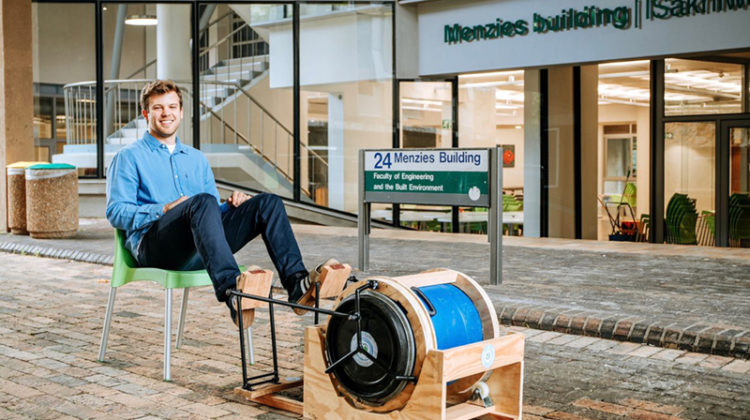
A University of Cape Town student’s design for a foot-cranked washing machine has won the RS Components International People.Planet.Product Student Design Challenge.
The sole African candidate among six finalists, Kai Goodall is a master’s student in the Department of Electrical Engineering in the university’s Faculty of Engineering and the Built Environment. His Pedal n Spin device refines the design, usability and sustainability of the current hand-cranked Divya washing machine. Operating the washing machine from a seated position, using the power of stronger leg muscles, provides better ergonomics and options for user posture and efficiency.
‘The design started with rapid prototyping and robust engineering testing to achieve the most efficient and reliable final washing machine design,’ said Goodall. ‘The manufacturing process of the final design was streamlined and developed with the hands-on support of Grant Bramwell, one of the directors of Forest Creations, a sustainable local woodwork workshop in Cape Town, South Africa.’
Combining sustainability and recyclability, the machine is made from wood and steel components, and can be easily manufactured and repaired in basic workshops. Design validation involved testing by people of varying age, size and physical strength, including Goodall’s 12-year-old brother and 85-year-old grandmother.
The machine can wash five kilograms of washing using 25 litres of cold water. ‘It can take hot water,’ Goodall said, ‘but its potential users, who either have no access to electricity or can’t afford it, will likely struggle to heat large quantities of water using fire.’
However, according to Goodall, ‘it’s not limited to low-income or displaced people. In an age of climate change, people are looking to reduce their carbon footprint and reliance on fossil fuels.’
‘I chose to study engineering to solve social problems through innovative ideas,’ Goodall said. ‘These are driven by the pressing need for new technologies to boost the renewable energy sector and the sustainability of the planet while improving the lives of people from all spheres of society.’
Goodall plans to use his winnings to further develop his design with further prototyping for field testing in communities that hand-wash their laundry, enabling him to compare hand-washing efficacy against the results of the Pedal n Spin machine.
Following final testing and optimisation of the design and manufacturing processes, Goodall will hand over the final design to the Washing Machine Project and RS Components for mass production and distribution to communities in need around the globe.


